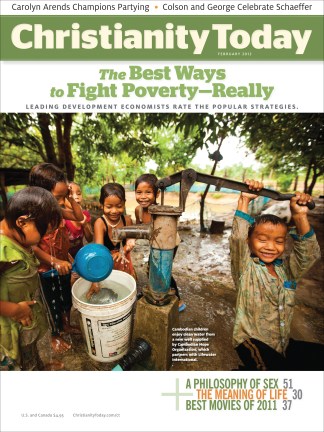Until recently, 58 was just a number. In 2011 it became a symbol of justice and possibility. 58—the movie, the book, the website, and the alliance—has focused believers' attention on "a global initiative to end extreme poverty by living out Isaiah 58." If you missed the conversation, check out Live58.org.
One of 58's key ideas is that we have everything we need to end extreme poverty. That claim raises questions best answered by development economists. In this issue, University of San Francisco economist Bruce Wydick reports on which poverty-fighting methods are the most effective. See the expert rankings in "Cost-Effective Compassion".
But there is another side to fighting poverty: high-touch activity that focuses on peoples' need for support and skills, not just public health measures and economic investment. Decades ago, when I chaired the board of a church-based social service agency, I saw this in extreme form. A homeless woman who had been living in a large sedan gave birth in a local hospital. The hospital wouldn't release the little boy until the mother had a proper place to take him, so my wife and I offered our home as temporary shelter. We soon saw that she needed more than a place: She didn't know the first thing about caring for her child. Strangely, we had to teach her things we thought were primal instincts—like picking up and rocking a crying child and talking or singing soothingly to it.
Senior managing editor Mark Galli's essay "A Most Personal Touch" reminds us that there are things the church can do for the poor that are more important—and more uniquely Christian—than raising their standard of living. People need help cultivating life skills, strengths of character, and spiritual habits that help extricate them from poverty.
Mark won't tell you this, so I will: He and his wife, Barbara, have "lived out Isaiah 58" in the highly personal mode he commends. They have foster-parented a young man who needed a lot of personal coaching in order to graduate from high school and then find his way through college, employment, marriage, and parenthood. Barbara, who works professionally with refugees, has also volunteered with a remarkable ministry that helps homeless people. (You can read our 2006 profile of that ministry by going to ChristianityToday.com and searching for "bridge communities.")
Such highly personal work can be very rewarding, but it can also breed frustration. Nevertheless, Jesus calls us to care for the poor. Sometimes, we must do so in the most efficient ways; often, in the most costly ways.
Next month: We showcase some unique and largely unknown Christian colleges, and we quiz two of our youngest (and freshest) Christian college presidents about the future.
Copyright © 2012 Christianity Today. Click for reprint information.









